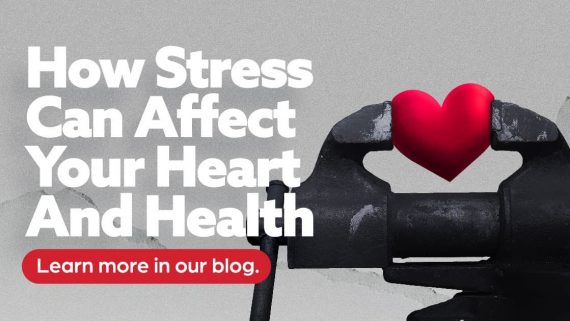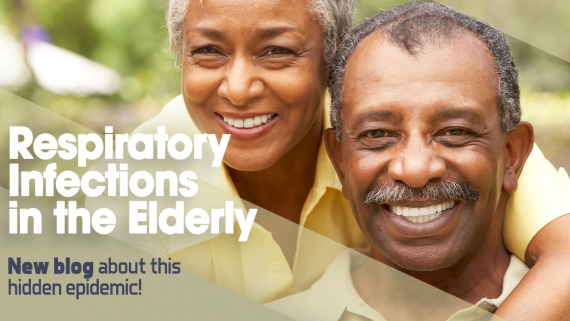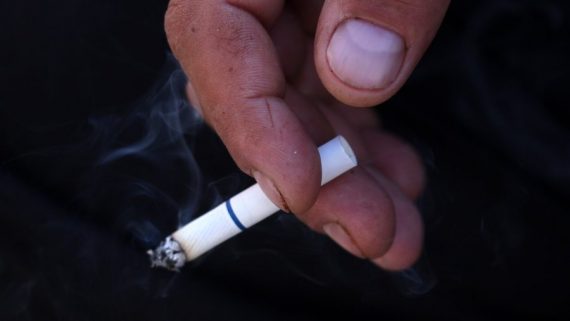We all experience stress, and it’s more prevalent these days amid the COVID-19 pandemic. However, long-term exposure takes a toll on our physical and mental health. Knowing how stress can affect your heart and body can be the biggest inspiration in finding healthy ways to reduce it. This is the message at the heart of the Stress Awareness Month initiative that kicks off every April.
Fight-Or-Flight: The Stress Response
The stress response is a series of changes that occur in the body to take care of a real or perceived threat. Stressors are different for everyone and are any situations a person perceives as mentally or physically terrifying. When a stressor triggers our stress response, our body goes into fight-or-flight mode. Your heart beats faster, breathing increases, and muscles tense up. Once the threat is gone, the body functions return to normal.
The stress response is a short burst of heightened awareness that dissipates with the threat. In today’s world, there are fewer physical and more psychological stressors such as:
- Parenting
- Financial issues
- Family or relationship difficulties
- Pressure at work
The Constant State of Heightened Awareness

Some stressors can take a while to resolve, meaning the threat is always present. It also means the stress response stays on, and the body is in a constant heightened awareness state. Long-term exposure to chronic stress takes a toll on the mind and body. Irritability, anxiety, depression, and insomnia are some of the mental health symptoms of chronic stress. No system in the body is safe from the effects of stress. At the same time, it also increases our risk of certain conditions. For example:
· Muscles– Contracting the muscles for prolonged periods can lead to tension headaches and migraines.
· Heart– Stress increases the heart rate and strength at which the heart muscle pumps. Doing this increases the size of the blood vessels and arteries. This raises the blood pressure and can eventually damage the blood vessels and lead to heart disease.
· Liver– The energy boost during the stress response comes from the liver, increasing the blood sugar it produces. Over time, higher blood sugar levels significantly raise your risk for type 2 diabetes.

You Can’t Avoid Stress, But You Can Manage It.
You can’t always avoid every stressful situation. Therefore, we have to learn effective ways to manage stress and reduce its effects on the body. Though every person’s needs will vary, a healthy diet, regular exercise, and relaxation techniques are some coping strategies helpful in managing stress.
Living with a chronic health condition can be stressful. Participating in clinical research studies can help you prioritize your health while you help advance care options for your condition. Volunteering also has many mental health benefits and has been shown to reduce anxiety and depression.

Visit our website to view a list of enrolling studies in your area today!
Sources:
https://www.heart.org/en/news/2020/02/04/chronic-stress-can-cause-heart-trouble
https://www.verywellmind.com/stress-and-health-3145086
Respiratory infections, like RSV and pneumonia, continue to wreak havoc on the elderly population year after year. Some call it a “hidden epidemic”. To better understand why the elderly are more vulnerable to respiratory infections, we need to look at what happens to our bodies internally as we grow older.
The Toll of Time
As we age, our immune systems become less effective, called immunosenescence. The immune response decline is different for everyone after age 65. However, everyone after that age is more susceptible to infections than when they were younger.
Risk Factors
With a less effective immune system combined with the increase and severity of a respiratory tract infection, the results can be life-threatening. Some risk factors include:
- Chronic Conditions- Heart disease, diabetes, stroke, and COPD are a few examples. Conditions that affect the ability to produce a strong cough can be especially dangerous.
- Infectious Environments- Any place where sick people gather for treatment or are living, such as hospitals and nursing homes.
Prevention
Experts agree that prevention is still the best defense against respiratory infection. The CDC has the following recommendations when it comes to reducing the chances of contracting a respiratory infection:
- Wash Your Hands Often– Use soap and water for 20 seconds. If soap is not available, use alcohol-based hand sanitizer
- Keep Up With Regular Vaccinations: Keep up to date on recommended vaccines
- Keep Hands off Your Face- Avoid touching eyes, nose, and mouth with unwashed hands
- Avoid Close Contact with Sick People- Avoid kissing, sharing drinks, or sharing eating utensils with people who have symptoms of being sick
- Cover Coughs and Sneezes- Cover mouth and nose with a tissue when you sneeze or cough. Throw tissues in the trash after
- Clean/Disinfect Surfaces- Disinfect surfaces that are frequently touched, such as doorknobs
- Stay Home When You Are Sick- Staying home (when possible) from work or other public places when you are sick prevents it spreading to others
At ActivMed Practices & Research, Inc., we are committed to not only working with patients to find current treatments that will deliver the most impactful results, but also working to develop new treatment options through clinical studies.
We are currently seeking patients for upcoming studies evaluating trial medications that may prevent RTI in those 65 and older. Qualified candidates who participate will receive study-related care at no cost. There is also compensation for travel. To learn more and see how you or someone you love may qualify for a study, please click HERE.
References:
https://www.cdc.gov/rsv/factsheet-older-adults.html
https://www.infectioncontroltoday.com/infections/older-adults-higher-risk-respiratory-infections
https://www.aging.com/what-causes-pneumonia-in-the-elderly/
August brings the arrival of Psoriasis Awareness Month. A chronic, systemic disease of the immune system, psoriasis most often appears on the skin as raised, itchy red patches. Living with psoriasis can seem like an uphill battle, but it’s important to know that if you’re struggling with psoriasis, you’re not alone.

The National Psoriasis Foundation reports that as many as 7.5 million American have psoriasis. Included in that number are people like you and me, but also people that many look up to, even idolize, like Kim Kardashian and Cyndi Lauper.
Cyndi Lauper is an icon is the music world, known for many hits that are still popular today. She revealed to PEOPLE magazine her psoriasis struggle that began back in 2010 with irritation on her scalp that she simply chalked up to bad hair dye.

Unfortunately, her scalp irritation then turned into an entire body rash complete with itchy, scaly skin over the next couple of years. Her immune system suffered as well. It took a toll physically and emotionally, and affected her ability to perform. Now, Lauper has found a treatment plan that helps her to manage her symptoms. She also avoids eating and drinking things that are associated with inflammation.
Psoriasis is the most prevalent autoimmune disease in the U.S. and not every treatment is a good fit for each person struggling to mange systems. If you or someone you love has been diagnosed with psoriasis, ActivMed is currently enrolling studies for potential new treatment options at the Portsmouth, NH and Beverly, MA sites. Qualified candidates who participate will receive study-related care at no cost and receive compensation for travel. To learn more and see if you qualify for a study at our Portsmouth, NH location, CLICK HERE. For our Beverly, MA location, CLICK HERE.
Psoriasis
is a disease that causes red, scaly patches to appear on the skin. It typically occurs on places like knees, scalp, and elbows, but can really show up anywhere. The uncomfortable rash can sometimes itch or burn. Psoriasis doesn’t stop at the skin. While the physical struggles associated with skin issues can be considerable, the disease can also affect your mental and emotional health.
According to the National Psoriasis Foundation, people with psoriasis are more likely to suffer from depression. The stigma associated with visible psoriasis can also make people depressed.
The red, scaly patches can be embarrassing. Many people will opt to wear long sleeves to conceal their psoriasis, and in the summer this is especially hard as heat and sweat can make psoriasis worse. While you may be anxious about showing too much skin, you don’t want to allow yourself to become overheated.
Many people will notice that their symptoms seem to improve during the summer months. While you may notice a reduction in your skin patches with added sunlight, remember to limit your sun exposure! Getting burnt could trigger a flare.
While psoriasis is one of the most common skin diseases, there is no cure. If you or someone you love is struggling to manage psoriasis symptoms, ActivMed is currently enrolling in studies for those seeking potential new treatment options. Qualified candidates who participate will receive study-related care at no cost and receive compensation for travel. To learn more and see how you or someone you love may qualify for a study at our Beverly location click HERE or at our Portsmouth site, click HERE.
If you or a loved one struggle with COPD (Chronic Obstructive Pulmonary Disease), take comfort in the fact that you are not alone! Contrary to popular belief, COPD is more than just a smoker’s cough, it is a life-threatening disease that interferes with breathing. There are an estimated 64 million people who live with COPD.
The most common cause of COPD is tobacco smoke through tobacco use or second-hand smoke. Warning signs for COPD are frequently dismissed and, usually, people think that the reason they are short of breath is due to “just getting older.”
Common COPD Symptoms:
- shortness of breath (often the first sign)
- coughing
- wheezing
- having a tight feeling your chest
- feeling winded going up the stairs
- frequently needing to catch your breath.
People with COPD are more likely to have frequent colds, recurring bouts of the flu, or pneumonia and all of these can cause shortness of breath, coughing, and other symptoms. Shortness of breath and coughing can also be a sign of asthma which is why women with COPD are more likely than men to be misdiagnosed with asthma.
In the late 1960’s, tobacco companies heavily targeted women, resulting in an increase of women who started smoking and COPD now affects men and women almost equally because of increased tobacco use among women. Women are more likely to have lung damage from cigarette smoke than men are because women’s lungs are smaller and higher estrogen levels tend to worsen lung disease. Women are often misdiagnosed because COPD has been thought of as a man’s disease.
People are often diagnosed with COPD between age 50 and 60 when symptoms are so obvious that they can no longer be ignored, but COPD actually can begin to develop around age 40.
To find out if a patient has COPD, a doctor will have a patient breathe into a tube hooked up to a spirometer which measures how much air the patient exhales. More primary care doctors use this simple method to test anyone who is at risk for COPD, even if they don’t have symptoms.
COPD is the 5th biggest killer worldwide and is estimated to kill over 250 people worldwide. Although there is no cure for COPD, it can be found early and steps can be taken to help manage the disease. With medications, oxygen therapy, pulmonary rehabilitation and social support, many people diagnosed with COPD are able to live long lives.
How to Get Involved:
If you or someone you love has been diagnosed with COPD, a medical research study may be an option. ActivMed is currently seeking participants for several current and upcoming studies. Qualified candidates who participate will receive study-related care at no cost and receive compensation for travel. To learn more and see if you or someone you love may qualify for a study, click HERE.
Acne is a skin condition that occurs when hair follicles become clogged with oil and dead skin cells. Pimples, blackheads, and bumps on the face, chest, and back are all typical of acne. Acne is most common in teenagers and young adults, but can present at any age. Dealing with acne can be incredibly frustrating and embarrassing. You’ve probably heard an overwhelming number of tips and tricks for getting clear skin. Let’s talk about which of those tips hold some truth and which are simply myths.
Fact: If you’re prone to acne breakouts, excessive touching of your face can trigger breakouts and exacerbate acne symptoms. Every time you touch your face you’re introducing whatever germs your hands have come in contact with to your skin, so remember – hands off!
Myth: Don’t wear sunscreen; it will trigger a breakout. It’s all about choosing the right sunscreen. If you’re acne prone, steer clear of chemical sunscreens and opt for physical sunscreens which work by sitting on top of the skin to deflect UV rays. Physical blockers are made of zinc oxide and titanium dioxide and are great choices for people with sensitive or reactive skin.
Fact: Popping pimples does more harm than good. We think that popping a pimple will make it go away more quickly when in fact squeezing or picking can push bacteria further into the skin and lead to scarring.
Myth: Eating chocolate gives you acne. The role of chocolate and how it affects acne remains somewhat controversial. While studies don’t show that chocolate itself worsens acne, some studies have indicated milk products may influence acne because of the hormones and bacteria present in milk.
Fact: Tanning is not the answer. While evidence exists to show that sun exposure can improve acne symptoms, UV exposure is associated with a number of other dangerous drawbacks such as accelerated skin aging and an increased risk for skin cancer.
Myth: Acne is contagious. Unlike most bacterial infections, it is not contagious and cannot be spread from person to person.
While dealing with acne can seem like an uphill battle, being familiar with some important key facts may help when it comes to managing this condition. If you or someone you love is struggling with acne, ActivMed is currently enrolling in studies for those seeking new treatment options. Qualified candidates who participate will receive study-related care at no cost and receive compensation for travel. To learn more and see how you or someone you love may qualify for a study at our Portsmouth, NH location CLICK HERE or at our Beverly, MA location by CLICKING HERE.
Our blog provides general information about health and related subjects. This content should not be interpreted as medical advice.
The term ‘millennials’ refers to the roughly 85 million people reaching young adulthood in the early 21st century. This group has also been deemed ‘Generation Y’ and typically refers to those born in between the 1980s and 1990s. Millennials may often be viewed by sociality as a lazy and entitled group of individuals. Yet, it is estimated that approximately 1 in 5 millennials suffer from depression. Why is depression among this generation in America soaring?
One reason for this epidemic is supply and demand in the workforce. Millennials are the most educated generation in history. Unfortunately, the supply of educated millennials significantly exceeds the demand for workers. According to Forbes, the millennial unemployment rate rests at 12.8%, compared to the national average rate of 4.9%. Many that do find jobs, end up settling into low paying positions that don’t utilize their skills, or jobs that only offer part-time work.
Another factor contributing to depression amongst Generation Y is student loan debt. According to The New York Federal Reserve the total student loan debt is estimated to be over $1.3 trillion. Student loan debt in the U.S. is more than auto and credit card debt combined, only falling short of mortgage debt. The average student loan debt for a millennial is $30,000 while the average salary is less than $35,0000 annually. This may also be a contributing factor to why more than 30% of millennials are living back with their parents.
Growing up with technology on the rise and at their fingertips, millennials and are used to instant gratification. The explosion of social media created ways to filter their lives, and may not depict reality. Preoccupations with comparing each other’s lives can also lead to serious symptoms of depression.
If you or someone you love is struggling with depression and not happy with current treatment, ActivMed is currently enrolling in studies for those seeking new treatment options. Study participants who qualify are closely evaluated by a board-certified physician and research staff. Reimbursement is also available for travel in the form of travel stipends. To learn more and see how you or someone you love may qualify for a study, click HERE.
Binge Eating Disorder, or BED, is the most common eating disorder in the United States. It is a serious medical condition where individuals eat significantly more food in a short period of time than most others would under similar circumstances. It’s marked by feelings of lack of control, shame, guilt, and embarrassment. While overeating can be a normal tendency for many individuals, someone with BED has recurrent episodes of bingeing leading to emotional and sometimes physical distress.
Many people will experience bouts of overeating who do not have BED. Holidays, parties, vacations, etc. can all be cause for episodes of overeating. However, these things happen occasionally and are not part of everyday eating habits. Drawing the line between overeating and Binge Eating Disorder comes down to frequency, feelings of loss of control, and emotions and feelings during and after a binge eating episode.
BED sufferers binge regularly, at least one to two times per week and find binge eating episodes to be very upsetting. They prefer to eat alone because of embarrassment associated with their eating behavior. They will eat large amounts of food even when they are not hungry to the point where they are uncomfortably full.
While binge eating disorder is very common, it often goes unnoticed due to the embarrassment and shame associated with the disorder. If you or someone you love is struggling with BED, ActivMed is currently enrolling studies for those seeking new treatment options. Study participants who qualify are closely evaluated by board-certified physicians and other medical professionals. Reasonable reimbursement is also available for travel for those who qualify and decide to participate. To learn more and see if you or someone you love may qualify for a study in Methuen, CLICK HERE. Learn more about studies in Portsmouth, NH by CLICKING HERE.


















